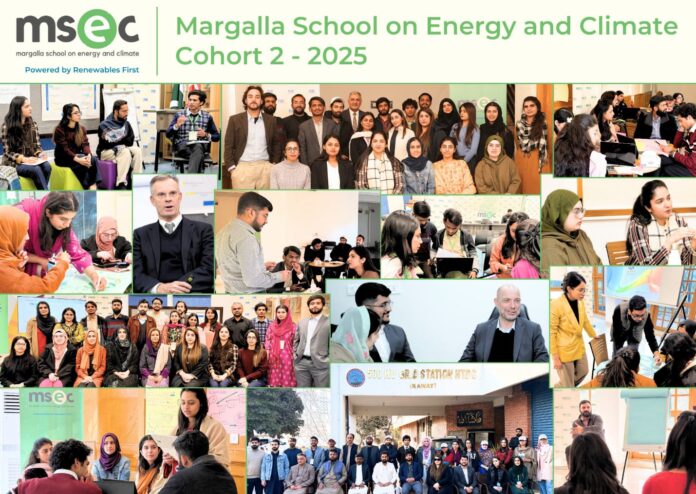- Advertisement -
ISLAMABAD, Feb 22 (APP):To mark the culmination of MSEC’s second fellowship cohort, a high-level Networking Dinner was held on Friday, in Islamabad, brought together Pakistan’s leading energy experts, policymakers, and industry leaders to connect with the next generation of energy and climate professionals.
At the event, Zeeshan Ashfaq, CEO of Renewables First, emphasized the broader vision of energy transition, highlighting that it is not just about replacing fossil fuels with renewables, but about building the right people to lead the transition, said a press release.
“The energy transition isn’t just about swapping coal for the sun or wind for oil – it’s about empowering the next generation to lead the charge,” Ashfaq said. “At the Margalla School, we are not just teaching energy; we are shaping the leaders who will define its future. The challenges ahead are big, but so is the ambition of these young professionals. To them, I say – BRING IT ON!”
MSEC’s fellowship program ensures that young professionals are not only educated in renewable energy policy but also equipped with practical expertise in power systems, climate finance, and energy market dynamics. This initiative fills a critical gap in Pakistan’s workforce by offering hands-on experience and industry engagement.
The transition to renewable energy is not just a policy shift – it requires strong industry alignment to ensure a smooth and sustainable transition. Aisha Moriani, Additional Secretary In-charge, Ministry of Climate Change and Environment, underscored the importance of energy efficiency and climate-aligned strategies.
“Pakistan faces huge implications of climate change, so we must adopt both adaptation and mitigation strategies,” Moriani said. “It’s crucial that our industry aligns with these efforts, adopting energy-efficient approaches that reduce emissions and enhance sustainability.”
She further noted that the Ministry of Energy has launched several initiatives to support green skills development, ensuring that Pakistan’s workforce is equipped to meet the demands of a low-carbon economy.
“Another very important source of emissions is transport,” Moriani added. “One of Pakistan’s commitments under international climate agreements is that by 2030, 30% of our new vehicles will be electric. Keeping that in view, we have developed an EV policy to accelerate this transition.”
Despite Pakistan’s ambitious renewable energy targets, power market reforms, and climate adaptation policies, the country’s education system has failed to keep pace. Graduates entering the energy sector lack a fundamental understanding of power markets, grid dynamics, and policy implementation – critical areas that impact the success of Pakistan’s clean energy transition.
“Pakistan should be at the forefront of climate action. It’s a country of 240 million people – for us, climate change is not just numbers, it’s actually lives at stake,” said Muhammad Mustafa Amjad, Program Director at Renewables First. “The gap between academic knowledge and practical industry expertise is a major roadblock. Through MSEC, we are equipping young professionals with the tools they need to drive real, transformative change in the sector.”
The MSEC fellowship includes rigorous training, mentorship, and project-based learning designed to bridge the gap between theory and implementation. By engaging directly with experts in power systems planning, grid modernization, and market reform, fellows gain hands-on experience that prepares them to address real-world energy challenges.
One of the key takeaways from the event was the importance of policy, infrastructure, and market reforms working in tandem. As Pakistan moves towards a competitive electricity market, the challenges of grid modernization, market access, and regulatory transparency must be addressed.
The MSEC Networking Dinner was more than a closing event – it was a call to action. As Pakistan faces rising energy costs, grid instability, and climate risks, the need for a skilled, informed workforce has never been greater.
Margalla School on Energy and Climate is Pakistan’s first dedicated platform to train professionals in energy systems, climate resilience, and the complexities of the power sector.
An initiative of Renewables First, MSEC is committed to developing practical expertise rather than just theoretical knowledge – ensuring that Pakistan’s energy transition is not just policy-driven, but led by capable professionals who understand its real-world challenges.

